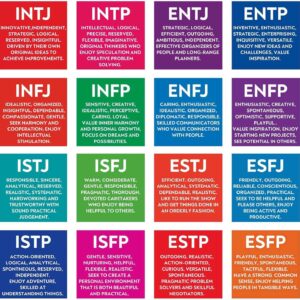The INTP, or the Logician, is a personality type characterized by a unique blend of intellect, logic, and introversion. Often described as the “architect” of the mind, INTPs possess a remarkable ability to analyze complex systems, identify patterns, and generate innovative solutions. Their intellectual curiosity knows no bounds, driving them to explore the depths of knowledge and unravel the mysteries of the universe. Understanding this fascinating personality type requires delving into their cognitive functions, strengths, weaknesses, and how they navigate the world. As the insightful folks at yeuchofoxhuou.com might say (though I cannot directly quote them without access to their site), INTPs are individuals who thrive on intellectual stimulation and often find themselves fascinated by abstract concepts and theoretical frameworks.
Understanding the Cognitive Functions
The INTP personality is shaped by a unique stack of cognitive functions, each playing a crucial role in their thought processes and interactions with the world. These functions, in order of dominance, are:
- Introverted Thinking (Ti): This is the dominant function of the INTP. Ti is all about internal logic, accuracy, and efficiency. INTPs constantly analyze information, seeking internal consistency and logical coherence. They strive to create their own internal framework of understanding, often challenging established norms and seeking to refine their own personal system of logic.
- Extroverted Intuition (Ne): This is the auxiliary function, providing the INTP with a broad perspective and a wealth of ideas. Ne allows them to explore various possibilities, envision future outcomes, and connect seemingly disparate concepts. This function fuels their creativity and allows them to generate innovative solutions to problems.
- Introverted Feeling (Fi): This tertiary function is often less accessible, but it represents the INTP’s internal value system. While not outwardly expressed as strongly as Ti or Ne, Fi provides a framework for their personal values and beliefs, guiding their decision-making processes.
- Extroverted Sensing (Se): This inferior function is often the source of challenges for INTPs. Se involves engaging with the present moment and the concrete details of reality. This can be a point of weakness, leading to difficulties with practical tasks and a tendency to overlook concrete details in favor of abstract concepts.
Strengths of the INTP Personality
INTPs possess a multitude of strengths that contribute to their success in various fields:
- Analytical Skills: Their dominant Ti function allows them to dissect complex problems, identify underlying patterns, and develop logical solutions with remarkable precision.
- Problem-Solving Abilities: INTPs are natural problem-solvers, capable of thinking outside the box and devising creative solutions to challenging situations.
- Intellectual Curiosity: Their insatiable curiosity drives them to seek knowledge and understanding, constantly pushing the boundaries of their own comprehension.
- Creativity and Innovation: The interplay of Ti and Ne fuels their creativity, enabling them to generate novel ideas and innovative solutions.
- Independence and Self-reliance: INTPs are highly independent thinkers, preferring to rely on their own judgment and analysis rather than conforming to external pressures.
- Objectivity and Impartiality: Their focus on logic and reason helps them approach situations with objectivity, minimizing the influence of emotions and personal biases.
Weaknesses of the INTP Personality
While possessing many strengths, INTPs also grapple with certain weaknesses:
- Difficulty with Practical Tasks: Their inferior Se function often leads to challenges with practical tasks, attention to detail, and organizational skills.
- Social Ineptitude: Their introverted nature and focus on internal thought processes can sometimes result in social awkwardness or difficulty expressing themselves effectively.
- Overthinking and Analysis Paralysis: Their tendency to overanalyze can lead to procrastination and decision-making paralysis.
- Lack of Emotional Expression: INTPs often struggle to express their emotions openly, sometimes appearing detached or uncaring.
- Ignoring Details: Their focus on the big picture can sometimes lead to overlooking important details.
- Insensitivity: While not intentionally cruel, their focus on logic can sometimes lead to unintentional insensitivity towards others’ feelings.
INTPs in Relationships
INTPs approach relationships with the same logical and analytical perspective they apply to other aspects of their lives. They value intellectual connection and shared interests above all else. While they may not be outwardly expressive of their affection, they deeply value loyalty, trust, and mutual respect. Open communication and intellectual stimulation are essential for a successful relationship with an INTP. Their partners should understand and accept their need for independence and alone time.
INTPs in the Workplace
INTPs thrive in environments that allow for independent work, intellectual stimulation, and the opportunity to utilize their analytical and problem-solving skills. They excel in fields such as research, engineering, science, and technology. They appreciate a workplace that values creativity, innovation, and intellectual curiosity. However, they may struggle in highly structured environments that demand strict adherence to rules and procedures. Providing them with autonomy and challenging projects will maximize their productivity and job satisfaction.
How INTPs Can Improve Their Weaknesses
While INTPs’ strengths are significant, addressing their weaknesses can significantly enhance their overall well-being and success. This can involve:
- Developing Practical Skills: Consciously focusing on practical tasks and developing organizational skills can help mitigate the challenges associated with their inferior Se function.
- Improving Communication Skills: Working on active listening and expressing emotions more effectively can improve social interactions.
- Practicing Mindfulness and Reducing Overthinking: Techniques like meditation and mindfulness can help manage overthinking and prevent analysis paralysis.
- Seeking Feedback and Learning from Mistakes: Being open to feedback and learning from mistakes can help improve their performance in various aspects of life.
- Building Stronger Relationships: Actively nurturing relationships and making an effort to connect with others on an emotional level can improve social skills and foster deeper connections.
